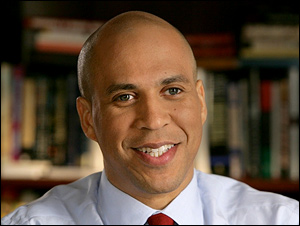Yesterday, just 8.8 percent of New Jersey voters went to the polls (481,847 of more than 5.47 million registered with 98 percent of precincts reporting) to participate in the special primary election for US Senate, a process that will prove to be the determinative step in choosing the late Sen. Frank Lautenberg’s (D) successor.
As aggregate polling had almost exactly predicted since the first day of this special election cycle, Newark Mayor Cory Booker commanded the Democratic primary. He racked up 59 percent of the vote compared to second place Rep. Frank Pallone’s (D-NJ-6) 20 percent, third-place finisher Rep. Rush Holt’s (D-NJ-12) 17 percent, with Assembly Speaker Sheila Oliver tallying only 4 percent.
Under Gov. Chris Christie’s (R) special election schedule, the general election vote is Wednesday, Oct. 16, and will officially feature Booker and Republican former Mayor Steve Lonegan (R-Bogota) who easily won the GOP nomination. Lonegan attracted 79 percent of the GOP vote against physician Alieta Eck. Six Independents will also appear on the general election ballot. The national Republican Party apparatus is not expected to actively support Lonegan, virtually conceding the seat to Booker.
The Newark mayor raised close to $10 million for the special primary election ($8.6 million through the final July 24 pre-primary disclosure period) as compared to Pallone’s $729,000 through the same period, though the congressman was able to transfer some $3.3 million from his US House committee. Holt raised over $962,000 during the same time frame and transferred an additional $500,000 from his congressional account to exceed $1.4 million in total Senate campaign receipts. Oliver reported raising less than $12,000.
Of the more than 481,000 people who voted yesterday, 352,120 participated in the Democratic primary. In a state where Democrats outnumber Republicans 38-20 percent, the special general will prove to be a mere formality. Almost a majority of voters, 47 percent, remain officially Unaffiliated. Obviously, based upon the state’s voting history, the vast preponderance of this large group leans decidedly Democratic.
Once Booker is elected in October, the Senate will return to its previous 55D-45R split prior to Sen. Lautenberg’s death. In the meantime, Gov. Christie appointed Republican Jeff Chiesa, the state’s Attorney General, to serve in an interim capacity.
AR-4 Candidates
Now that Arkansas Rep. Tom Cotton (R) has made his Senate campaign official, the state’s 4th Congressional District will again be open for the 2014 election. In the last election, Cotton succeeded the retiring Rep. Mike Ross (D) who is now running for governor.
As had been expected, Lt. Gov. Mark Darr (R), who had launched his own Senate campaign, officially dropped down into the open House race at the beginning of this week. A day later, state House Majority Leader Bruce Westerman (R) announced his own campaign. Other Republicans are soon expected to enter the race.
The Democrats are projected to be more competitive in this open seat race than they were against Cotton, when the party fielded a weak general election nominee. The 4th District now leans Republican, but the seat has a Democratic voting history. With Ross on the statewide ticket, the Democratic base should be more motivated than normal to vote in a mid-term election, though the seat did significantly change in the Republicans’ favor during redistricting.

